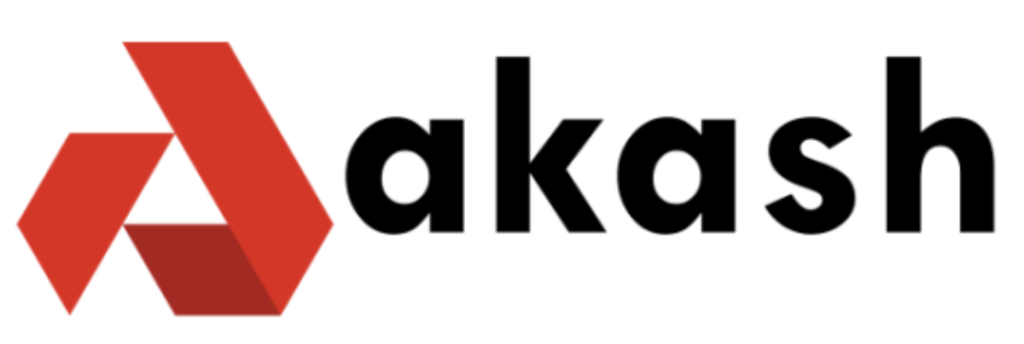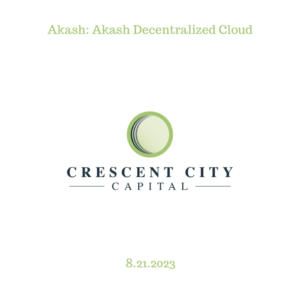Akash: Akash Decentralized Cloud
By Rayna Ishihara | Crescent City Capital Market Analyst Intern
What is Akash

Akash is an open-source platform that connects users seeking cloud services with providers who have excess computing resources. It operates as a decentralized cloud computing marketplace built on the Cosmos blockchain. Akash enables the hosting and management of deployments using Kubernetes and allows the deployment of any cloud-native application. The platform aims to distribute underutilized cloud capacity, providing more cost-effective and efficient cloud computing services compared to centralized alternatives. It targets decentralized finance (DeFi) developers and other high-computing fields, offering compatibility with existing cloud applications. Akash seeks to democratize access to cloud resources, offering flexible and affordable cloud services while collaborating with established cloud providers to revolutionize the cloud computing industry.
Akash is also called “Akash DeCloud”, which consists of the Akash Network and the Akash Platform. The network serves as a marketplace for leasing computing resources, while the platform facilitates hosting and managing workloads using cloud management services. Akash offers user-friendly interfaces, flexibility, improved performance, and significant cost advantages compared to traditional cloud services. It competes at a rate 10 times lower than the market standard and is compatible with all cloud providers and applications. Akash aims to utilize underutilized cloud capacity and allows anyone to buy and sell cloud computing resources.
Akash Network was established in March 2018 by Overclock Labs and co-founded by Greg Osuri and Adam Bozanich. Greg Osuri, with experience in launching companies like Firebase and AngelHack, serves as CEO. The project’s whitepapers were released in December 2017 (Version 1), March 2018 (Version 2), and August 2018 (Version 3). The mainnet was launched on September 25, 2020, followed by Mainnet 2 on March 8, 2021, featuring a decentralized cloud compute marketplace, flexible bid pricing, IBC compatibility, deployment tools, and audited attributes. Akash Network addresses the concentration of power in the cloud computing industry by sourcing computing resources from a distributed network of data centers worldwide. Since the Mainnet 2 launch, Akash has experienced a significant increase in deployments. Adam Bozanich, the CTO, brings his engineering experience from various companies.
Akash Tech
Akash Network utilizes a Delegated Proof-of-Stake (DPoS) consensus mechanism to secure its blockchain. Validators and delegators play a crucial role in maintaining the network. Validators commit new blocks through a voting process, using tokens staked by delegators. They also contribute to the consensus mechanism and help secure the AKT network transactions by operating nodes. However, becoming a validator is not a trivial task and requires specific computing resources and technical expertise. The network also incorporates the Tendermint algorithm for speed and scalability. Akash is the first open-source, decentralized cloud platform, built on a Proof-of-Stake (PoS) blockchain using the Cosmos SDK. It prioritizes interoperability and exists within the Cosmos Hub ecosystem for enhanced cross-chain compatibility.
The Akash Network blockchain introduces a layer of trust in a decentralized and trustless environment through transparency and openness. The blockchain ensures trust by maintaining an immutable and public record of all transactions, including the fulfillment history of each provider. Akash Network is politically decentralized, meaning no single entity controls the network, and there is no intermediary involved in transactions. This structure prevents control or revenue extraction by any single party, fostering a fair and equitable ecosystem.
Akash Token
Akash Network uses its native utility token, AKT, for network security through staking and as the primary reserve currency in its multi-blockchain ecosystem. During the launch of Akash Network’s mainnet 1.0 in September 2020, an initial supply of 100,000,000 pre-mined AKT tokens was distributed among investors, the Akash Network foundation, and the team. Additionally, a public sale of 1,800,000 AKT tokens was conducted.
Node operators validating transactions on the Akash Network’s mainnet and receiving rewards must have a total AKT stake that ranks them among the top 100 holders within the network. This stake is a combination of their own allocation and delegated amounts. Validators are not required to stake a specific minimum of their own AKT. Increasing their AKT stake improves their chances of being chosen to validate transactions and earn rewards. Validators who do not follow consensus guidelines may face a reduction in their stake as a penalty.
Participation in governance is reserved for AKT holders, allowing them to propose and vote on changes. Submitting a proposal requires a non-refundable deposit of 1,000 AKT. If a proposal requiring code updates is approved, validators must implement the changes to continue validating the network without penalties. AKT functions as the reserve currency within the Akash ecosystem, used for gas fees and as the default medium of exchange in transactions between providers and tenants.
Recent Updates
The live AKT price on August 18th is $1.26 USD with a 24-hour trading volume of $3,132,578 USD. It has a circulating supply of 217,029,672 AKT tokens.
The price of Akash Network has risen by 23.06% in the past 7 days. The price declined by 6.85% in the last 24 hours. In just the past hour, the price grew by 0.87%. Akash Network is 85.19% below the all time high of $8.08.
Analysis
Akash Network has experienced significant growth over the past three months, with a remarkable growth rate of 263.34%. This surge in growth can be attributed to the partnership announced in March 2023 between Akash Network and Concordium blockchain.

The collaboration with Concordium enables projects on their platform to access cost-effective cloud server spaces for their decentralized applications (dApps). By integrating with Akash Network, Concordium users can leverage decentralized cloud storage and computational power, contributing to the decentralization of the Concordium blockchain. This partnership aims to enhance the capabilities of Concordium’s ecosystem, leading to mutual benefits for both Akash Network and Concordium.
Akash Network commenced trading in September 2020 at a price of $0.4443, coinciding with the launch of Akash Network’s mainnet 1.0. The price experienced rapid growth in early 2021, reaching its all-time high value of $8.08 on April 7th. Following a slight decrease, the price fell to $5 in March but quickly surged back to its previous peak in April. Notably, Akash announced the launch of its mainnet 2.0 in March, which likely contributed to the subsequent price jump as the network continued to upgrade its technology. Prices dipped to around $2.3 in July but rose again to $5.7 in September 2021.
However, the price of Akash entered a relatively low state towards the end of 2021 and throughout 2022, with only slight recovery this year. Nonetheless, Akash Network still holds significant potential for the future, as its price slump in 2022 can be largely attributed to the turbulence experienced by the entire cryptocurrency market. The challenging market conditions affected not only Akash but also other cryptocurrencies, including Bitcoin.
Akash Network consistently focuses on upgrading its offerings to deliver an enhanced user experience. In December 2022, the successful upgrade to Mainnet 5 showcased the platform’s commitment to providing a permissionless and sovereign cloud platform. This dedication empowers developers with increased access, autonomy, and flexibility in deploying their decentralized applications (dApps). By offering an open cloud infrastructure, Akash Network addresses the limitations of conventional cloud services, thereby accelerating the growth of the broader blockchain ecosystem.
Summary
Akash Network is an open supercloud platform that aims to revolutionize cloud computing by providing a decentralized and permissionless infrastructure for deploying and running applications. It offers developers the ability to access, lease, and monetize underutilized computing resources, creating a more cost-effective and flexible cloud solution. By leveraging blockchain technology, Akash Network enables users to overcome the limitations of traditional cloud providers, promoting greater accessibility, autonomy, and scalability for decentralized applications. With its commitment to open-source principles and a robust ecosystem, Akash Network is driving innovation and empowering developers to build and scale their applications in a more efficient and decentralized manner.
References:
https://www.kraken.com/learn/what-is-akash-akt
https://messari.io/report/akash-a-decentralized-approach-to-cloud-computing
https://medium.com/stakin/introduction-to-akash-network-7823d379c1cc

